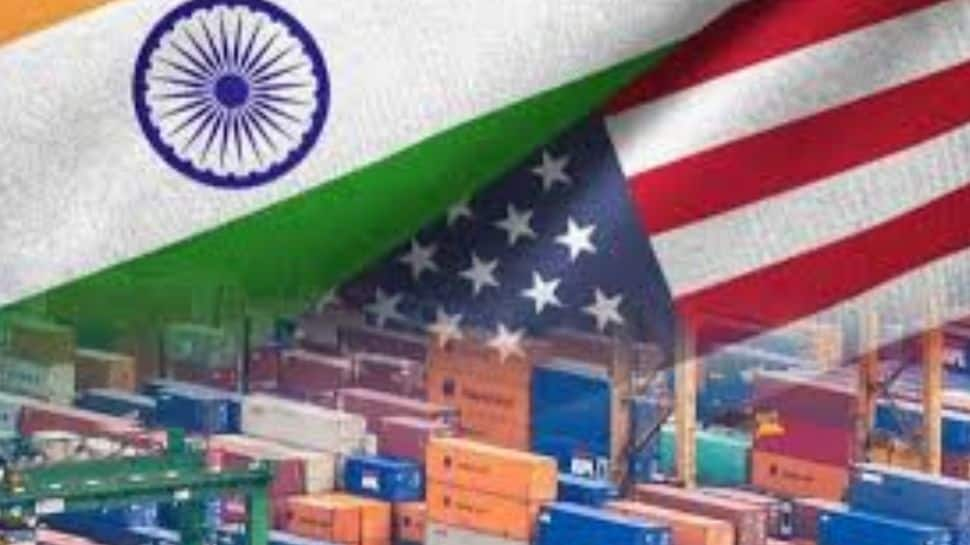Business
First Tranche of US-India Trade Deal Is Near Closure: Commerce Secretary

The BTA, formally proposed in February following directives from the leadership of both nations, seeks to more than double bilateral trade, from the current USD 191 billion to USD 500 billion by 2030.
|Last Updated: Nov 17, 2025, 05:18 PM IST|Source: ANI
Business
Export credit boost: Banks clear Rs 3,362 crore under CGSE in first month; 774 exporters covered – The Times of India

Lenders have sanctioned Rs 3,361.83 crore to 774 applicants under the Rs 20,000-crore Credit Guarantee Scheme for Exporters (CGSE) within a month of its rollout, as the government steps up support for exporters facing headwinds from steep US tariffs, official data showed as reported PTI.The scheme, approved by the Union Cabinet on November 12 and made operational from December 1, 2025, provides 100 per cent credit guarantee cover by the National Credit Guarantee Trustee Company Ltd (NCGTC) to member lending institutions (MLIs) for extending additional credit facilities of up to Rs 20,000 crore to eligible exporters, including MSMEs.“Applications worth Rs 8,764.81 crore (1,840 applications) received, out of which Rs 3,361.83 crore (774 applications) sanctioned by the lenders” till January 2, 2026, the Department of Financial Services (DFS) under the finance ministry said in a statement.Implemented by the DFS, the CGSE aims to enable banks and financial institutions to extend additional financial assistance to Indian exporters during a period of external trade uncertainties, helping them diversify markets and enhance global competitiveness. The scheme will remain valid till March 31, 2026, or until guarantees worth Rs 20,000 crore are issued, whichever is earlier.The DFS also highlighted progress under the Mutual Credit Guarantee Scheme for MSMEs (MCGS-MSME), which offers credit guarantees to incentivise MLIs to provide additional credit facilities of up to Rs 100 crore to MSME borrowers for the purchase of plant, machinery and equipment. As of December 2025, banks have sanctioned Rs 16,836 crore against 8.96 lakh applications under the scheme.Sharing broader banking sector performance, the DFS said scheduled commercial banks (SCBs) recorded their highest-ever aggregate net profit of Rs 4.01 lakh crore. Public sector banks (PSBs) posted a record aggregate net profit of Rs 1.78 lakh crore in 2024-25, while their net profit stood at Rs 0.94 lakh crore in the first half of 2025-26.Global deposits and advances of PSBs rose to Rs 146.27 lakh crore and Rs 114.85 lakh crore, respectively, in September 2025, compared with Rs 71.95 lakh crore and Rs 56.16 lakh crore in March 2015.The gross non-performing assets (GNPA) ratio of PSBs declined to 2.30 per cent (Rs 2.65 lakh crore) in September 2025, down from 4.97 per cent (Rs 2.79 lakh crore) in March 2015 and a peak of 14.58 per cent (Rs 8.96 lakh crore) in March 2018. The capital adequacy ratio of PSBs improved by 451 basis points to 15.96 per cent in September 2025 from 11.45 per cent in March 2015.
Business
2026 is the year of obesity pills. Here’s how they could reshape the GLP-1 market

The booming GLP-1 space was built on weekly injections. In 2026, new obesity pills will push the market into its next chapter.
Patients are already getting their hands on the first GLP-1 pill for obesity from Danish drugmaker Novo Nordisk — a once-daily drug that shares the same brand name as its popular injection Wegovy. A GLP-1 pill from the company’s chief rival Eli Lilly isn’t far behind, with a U.S. approval expected within months.
For some people, pills may serve as a more convenient — and potentially cheaper — alternative to today’s blockbuster injections. The cash prices of Novo Nordisk’s Wegovy pill range from $149 to $299 per month, depending on the dose, which is slightly less than the newly lowered cash prices of injections.
While the pills aren’t expected to bring more weight loss than weekly shots, based on separate clinical trials, some health experts say expanding the range of treatments could still be a major win for patients.
Pills could attract new patients to seek obesity treatment for the first time, expanding the broader weight loss and diabetes drug market and potentially boosting sales for Novo Nordisk and Eli Lilly. The new users may include people who are afraid of needles, as well as patients who could benefit from existing injections but don’t view their condition as severe enough to warrant a weekly shot.
“I think that there are a lot of people out there who have never tried these GLP-1 drugs and are maybe waiting for the pills to come out,” said Dr. Eduardo Grunvald, medical director of the UC San Diego Health Center for Advanced Weight Management. “It’s kind of a natural preference for some people and even some prescribers.”
“Secondly, if you have to pay out of pocket, the pills are going to be a bit less expensive than the injections, so that’s another reason,” he said.
The logo of pharmaceutical company Novo Nordisk is displayed in front of its offices in Bagsvaerd, on the outskirts of Copenhagen, Denmark, Nov. 24, 2025.
Tom Little | Reuters
It’s unclear exactly how many people are currently using GLP-1s in the U.S., especially for obesity. But around 1 in 8 adults said they were taking a GLP-1 drug to lose weight or treat another chronic condition as of November, according to a poll from health policy research organization KFF.
Now, pills are emerging as the next battleground for Novo Nordisk and Eli Lilly, which established the GLP-1 space that some analysts say could be worth almost $100 billion by the 2030s. In August, Goldman Sachs analysts forecast that pills could capture roughly 24% — or about $22 billion — of the global weight-loss drug market by 2030.
Here’s how obesity pills could reshape the space.
Pills could expand the market
Oral drugs may pull new patients into the obesity treatment market.
“I believe that this will quite a bit expand the market,” Novo Nordisk CEO Mike Doustdar told CNBC in late December. “We know from our own family members and circles of friends that there are many people who still would not rather take an injection … for this group of people, having a pill option is important.”
Pills could prompt some people to start obesity treatment because “they think it’s somehow more acceptable or approachable” than an injection, said Dr. Caroline Apovian, co-director of the Center for Weight Management and Wellness at Brigham and Women’s Hospital.
That doesn’t mean a pill will be the best fit for everyone. But once patients enter the health-care system for treatment, doctors can guide them through all options – whether that’s an injection, metabolic surgery, or structured diet and exercise programs, Apovian said.
UCSD’s Grunvald said uptake of obesity pills is likely to be driven by primary care physicians, who treat the majority of eligible patients and may be more comfortable prescribing an oral drug.
Grunvald said obesity medicine specialists, who care for only about 5% to 10% of eligible patients, are more likely to continue favoring injections, which appear more effective than pills based on separate clinical trials.
Deborah, a 53-year-old librarian in St. Louis, Missouri, said she is curious about the new Wegovy pill in part because of its convenience factor. She declined to provide her last name due to concerns about stigma associated with GLP-1s.
Deborah said she would consider an oral GLP-1 because she is already accustomed to taking pills for other prescriptions. She said an oral drug would also bring other benefits, like making travel easier because it won’t require refrigeration, like injections do.
She said she is also interested in the potentially lower costs of pills. Deborah has been taking weekly injections of Wegovy since June, and was paying $449 per month in cash before Novo Nordisk lowered that price to $349 per month.
Pills cost slightly less
Cost could be a factor for other patients, too.
Novo Nordisk’s pill appears to have among the lowest cash prices in the market, at $149 per month for the starting dose and $299 per month for the two highest doses. Eli Lilly’s rival pill is expected to have similar pricing for cash-paying patients.
Those users will also be able to access the starting dose of both pills for $149 per month through President Donald Trump‘s direct-to-consumer website, TrumpRx, under a deal both companies struck with his administration in November.
Obesity injections have long been hard for patients to get, due in part to spotty insurance coverage and list prices of roughly $1,000 per month. Both Novo Nordisk and Eli Lilly have moved to address those concerns by cutting cash prices for their injectable drugs to less than half that amount.
A combination image shows an injection pen of Zepbound, Eli Lilly’s weight loss drug, and boxes of Wegovy, made by Novo Nordisk.
Hollie Adams | Reuters
Eli Lilly in December said the highest doses of single-dose vials of Zepbound will cost $449 per month for cash-paying patients, while Novo Nordisk in November said nearly all doses of Wegovy will cost $349 per month in cash.
Those prices are closer to the cost of Novo Nordisk’s pill, which may still be expensive for some. But Grunvald said the roughly $150 monthly difference between the highest doses of Zepbound and Novo’s pill “could be a big difference for many people” willing to pay out of pocket.
Patients with insurance coverage for Novo Nordisk’s oral drug can pay as little as $25 per month for the treatment. But pills likely won’t move the needle to boost insurance coverage of GLP-1s for obesity in the U.S.
The direct-to-consumer cash prices of Novo Nordisk’s oral drug are likely “significantly less” than what employers and middlemen called pharmacy benefit managers would pay to cover the drugs, said John Crable, senior vice president of Corporate Synergies, an insurance and employee benefits brokerage and consultancy.
Crable said it is unclear how much the pill will ultimately cost payers such as employers since those prices are not publicly disclosed. But if they mirror injection costs — often higher than $1,000 per month — employers may be reluctant to add the drug to their formularies, he said.
Some companies that already offer coverage of obesity injections could add the pills this year. But Crable said some employers have actually dropped coverage of GLP-1s for obesity in 2026 due to their high costs.
“I don’t see employers being highly motivated to add what is probably going to be another high volume, very high cost drug to their formulary when the direct-to-consumer pricing for it is so much cheaper,” Crable said.
Injections are here to stay
Drugmakers have tried to make a case that patients using injections can switch easily to oral drugs. Eli Lilly in December released data showing that patients who initially took Wegovy or Zepbound shots maintained the majority of their weight loss after switching to the company’s pill.
But Apovian, of Brigham and Women’s Hospital, said cost would be the only real reason to move patients who are doing well on injections to a pill.
“If the [cash price] is similar, I always prefer the injectables because I believe that the weight loss is better and the side effects are less,” she said.
Apovian said she wants to see real-world data on how pills perform compared with injections, but separate late-stage trials already offer some clues.
Zepbound has shown average weight loss of more than 20% in late-stage studies. That’s higher than results seen with both the Wegovy injection and pill as well as Eli Lilly’s oral drug in separate trials.
In those same studies, about 7% of patients or less stopped treatment due to side effects from the Zepbound and Wegovy injections.
The Wegovy pill showed similar discontinuation rates, while about 10.3% of patients taking the highest dose of Eli Lilly’s oral drug stopped treatment because of side effects.
Leerink Partners analyst David Risinger said patients with obesity who need to lose a larger percentage of their body weight will likely stick with injections, unless they have a fear of needles.
Pills, he said, could primarily attract new patients who are overweight or mildly obese and want to achieve only “modest” weight loss.
Some patients currently using weekly injections may try pills, Risinger added, though not all will find a daily oral option more convenient.
That includes Karen Galante, 42, of Horsham, Pennsylvania, who is taking a compounded version of semaglutide – the active ingredient in Wegovy – which she said is priced similarly to Novo Nordisk’s new pill.
Galante said she does not plan to switch.
“It’s hard enough for me to remember to take my vitamins every day,” she said. “I like the set-it-and-forget-it of taking one shot a week.”
More than enough room for Novo, Lilly
Risinger said he expects both pills from Novo Nordisk and Eli Lilly to “take off like a rocket” this year.
He noted that uptake will be greater for the Wegovy pill initially since Eli Lilly’s drug, orforglipron, is likely still months away from entering the market.
But Risinger said he believes Eli Lilly’s pill will ultimately generate higher sales because patients could consider it more convenient.
Eli Lilly’s orforglipron is a small-molecule drug that is absorbed more easily in the body and doesn’t require dietary restrictions like Novo Nordisk’s pill, which is a peptide medication. Patients are supposed to drink no more than four ounces of water with the Wegovy pill and must wait 30 minutes before eating or drinking anything else each day.
But Novo Nordisk’s CEO Doustdar has argued that those dietary requirements won’t hinder uptake. He told CNBC in December it has not been an issue for the more than a million people who are taking the lower-dose version of the pill for diabetes, marketed as Rybelsus, which entered the market in 2019.
“Simply sip and go, and you’re going to be fine,” Doustdar said. “These people are waking up in the morning and taking their pill with a glass of water, and then they do their normal daily routine half an hour later and move on with their life.”
He also called the company’s drug the “most efficacious pill,” saying that no other products in development have been able to show its same level of weight loss in a late-stage trial.
The highest dose of Novo Nordisk’s Wegovy pill helped patients lose up to 16.6% of their weight on average at 64 weeks in one late-stage study. That’s comparable to the injectable form of the drug.
There are no head-to-head studies directly comparing that pill with Eli Lilly’s. In one of Eli Lilly’s late-stage trials, the highest dose of its pill helped patients lose 12.4% of their body weight on average at 72 weeks.
Despite that difference in efficacy, Risinger said the two pills are viewed as promoting roughly similar levels of weight loss. Some patients may also not need to take the highest dose of either pill, he added.
In an August note, Goldman analysts said they expect Eli Lilly’s pill to have a 60% share — or roughly $13.6 billion — of the daily oral segment of the market in 2030. They expect Novo Nordisk’s oral semaglutide to have a 21% share — or around $4 billion — of that segment. The analysts said they expect the remaining 19% slice to go to other emerging pills.
More competitors emerge
Other drugmakers are racing to bring their own oral options to the market, including Pfizer, AstraZeneca, Structure Therapeutics and Viking Therapeutics.
Risinger highlighted Structure’s daily oral GLP-1, which will enter phase three trials later this year. Shares of Structure soared more than 100% on Dec. 9 after it released midstage data showing that its pill, aleniglipron, helped patients with obesity lose more than 11% of their weight at 36 weeks, when adjusted for placebo.
Additional trial data showed that a higher dose of the pill could deliver greater efficacy – more than 15% weight loss – surpassing the results seen with the highest dose of Eli Lilly’s orforglipron. Still, the tolerability data, or how well patients tolerated Structure’s treatment, appeared to be worse than that of Eli Lilly’s pill.
In a release at the time, Structure CEO Raymond Stevens said the pill could be “potentially best-in-class” for an oral small-molecule GLP-1.
Risinger said he expects that pill and another oral GLP-1 from AstraZeneca could launch as soon as late 2028.
He said potential pills that are taken weekly, as opposed to daily, and have “compelling profiles could tilt the balance more towards orals” in the market.
Risinger pointed to privately held Verdiva Bio, which is developing several oral peptide treatments designed to be taken once a week. That company has an ongoing phase two trial on an oral GLP-1.
Business
Gen Z and social media are helping men’s makeup go mainstream. The beauty industry is trying to capitalize

Pixdeluxe | E+ | Getty Images
It often starts small.
A dab of concealer. A tinted moisturizer. Maybe a brow gel that goes from borrowed to bought. For many men, like Daniel Rankin, makeup has transformed from something taboo into a tool to make them look less tired and more put together.
“I remember thinking, ‘Am I really doing this?'” Rankin, a 24-year-old advertising agent from New York who likes to shop at Sephora, told CNBC. “But once I tried it, it just became normal.”
In front of bathroom mirrors and in gym locker rooms, more men are now adding cosmetics to their routines, industry experts told CNBC. The men’s makeup market is now one of the most lucrative — and largely untapped — growth opportunities left in beauty, and specialty retailers like Ulta Beauty and Sephora along with big-box companies like Target and Walmart all see opportunity.
“Men’s beauty is one of the last categories left where brands can likely still see easy double-digit growth potential simply by showing up,” said Delphine Horvath, professor of cosmetics and fragrance marketing at the Fashion Institute of Technology.
Men’s grooming sales in the United States topped $7.1 billion in 2025, up 6.9% year over year, according to market research firm NielsenIQ. The global market was valued at $61.6 billion in 2024 and projected to surpass $85 billion by 2032, with the biggest growth driven by the skin-care sector, according to Fortune Business Insights.
Much of the momentum is coming from Gen Z.
In the U.S., 68% of Gen Z men ages 18 to 27 used facial skin-care products in 2024, a sharp jump from 42% just two years earlier, according to data from market intelligence firm Mintel.
“This is no longer niche,” said Linda Dang, CEO of Canada-based Asian beauty retailer Sukoshi. “Men are forming routines, that usually starts at skin care and then expands further, they are no longer just buying random products. That’s what makes this market so valuable.”
Bloomberg | Bloomberg | Getty Images
Unlike one-off grooming purchases, makeup encourages repeat use and experimentation. A man who starts with concealer often adds primer, setting powder or tinted SPF over time, said Farah Jemai, global marketing associate lead at beauty brand Unleashia.
“When men discover makeup that works, they don’t use once and never again,” Jemai told CNBC. “They restock.”
Market researchers estimate that in 2022, about 15% of U.S. heterosexual men ages 18 to 65 were already using cosmetics and makeup, while another 17% said they would consider it, according to Ipsos. Industry experts say those figures are likely higher in 2026.
Openness to cosmetics has grown, as the share of U.S. men who say they never wear makeup has fallen from more than 90% in 2019 to about 75% in 2024, Statista survey data show.
Retailers cater to men
Beauty conglomerates and startups alike are responding to the growth in men’s beauty.
Ulta Beauty and and Sephora have begun integrating men’s complexion products into gender-neutral, skin care-first displays rather than having “Men’s” aisles. Those gender-specific displays can feel intimidating or stigmatizing to some men, Horvath said.
Big-box retailers like Walmart and Target have also expanded their men’s cosmetics or grooming offerings.
For example, in 2025, Target partnered with online streaming collective AMP, Any Means Possible, to launch TONE. The men‑forward personal care brand debuted in Target stores nationwide in July, leveraging AMP’s massive Gen Z male following across YouTube and Twitch.
Online — where much of the growth and discovery is happening — many beauty brands are pouring money into influencer partnerships to increase engagement and sales on TikTok Shop and Amazon.
“So many brands are now putting most of their marketing budget into influencer marketing to meet people where they already are online and make it easier to click ‘buy,'” said Janet Kim, a vice president at K-beauty brand Neogen.
Others are leaning into digital education to teach men what different items do.
The brand War Paint sells makeup products like concealer pens, tinted moisturizers and anti-shine powders that feature QR codes on the packaging. Scanning them launches video tutorials explaining what each product does — without forcing customers to ask questions in a store.
“The biggest barrier isn’t price, it’s uncertainty,” Dang said. “Men want to know what a product does and how to use it without feeling awkward.”
But the path to mass adoption isn’t guaranteed.
Industry analysts warn that social stigma remains high and inflation threatens to curb spending on experimental, nonessential goods. Retailers also face a steep learning curve: It is difficult to scale a market when the core customer doesn’t know how to use the product.
Target’s SoHo store has an eye-catching “Beauty Bar” that shows off fragrances, makeup items and more.
Courtesy of Target
The emergence of men’s makeup
While men have worn makeup for centuries, from ancient Egypt to Elizabethan England, the modern commercial men’s makeup movement traces its roots to the mid-2010s.
In 2016, CoverGirl made history by appointing then 17-year-old YouTuber James Charles as its first-ever “CoverBoy,” placing a male face on a mass-market cosmetics brand for the first time.
Still, beauty conglomerates largely focused on women until recently, Sukoshi’s Dang said. Now, a broader cultural reset around masculinity is taking place and companies are racing to monetize it, FIT’s Horvath said.
Social media has been the single biggest accelerant, Dang said.
On TikTok and Instagram, male creators post step-by-step makeup routines, product breakdowns and before-and-after results that often emphasize subtle changes rather than dramatic looks. Hashtags tied to men’s grooming and makeup have amassed billions of views, with #mensgrooming alone surpassing 26 billion views on TikTok.
“TikTok democratized the ‘how-to,'” said Dang. “You don’t have to ask your sister or guess anymore. You just scroll, see a guy who looks like you fixing his acne in 30 seconds, and click ‘buy.’ It removed the gatekeepers.”
Gen Z men are also more comfortable rejecting rigid gender categories and more skeptical of marketing that frames products as inherently masculine or feminine, Horvath said.
At the same time, makeup has increasingly been folded into a broader wellness and optimization culture — sometimes referred to as “looksmaxxing” — that includes fitness tracking, supplements, hair-loss prevention and longevity routines.
“Many men have started framing grooming and, for some, makeup as maintenance, not vanity,” Horvath said. “That reframing removes stigma and unlocks spending.”
Celebrity influence has further accelerated adoption, with stars like Harry Styles, Brad Pitt and Dwayne “The Rock” Johnson launching their own skin care and makeup brands, mirroring the trend of celebrity saturation largely seen in spirits.
Johnson’s brand Papatui, which launched at Target in 2024 and spans skin, hair, body and tattoo care, was created in response to ongoing questions about his grooming regimen. It now competes directly with legacy names like Clinique, L’Oréal and Kiehl’s.
CoverGirl James Charles
Source: COVERGIRL
Moving ahead
As the market matures, a debate is forming: Do men want “men’s makeup,” or do they just want makeup?
Horvath said there is a “bifurcation” in how companies are marketing their products.
Brands like War Paint and Stryx argue that men need products designed for their thicker, oilier skin, and packaged in masculine, tool-like containers that feel at home in a gym bag.
But Gen Z consumers are increasingly gravitating toward gender-neutral brands like LVMH co-owned Fenty Beauty, The Ordinary and Haus Labs. For them, labels that say “For Men” can feel outdated or even patronizing, Horvath said.
“In ten years, I don’t think we’ll be talking about ‘men’s makeup’ anymore,” Horvath said. “We will just be talking about makeup. The gender binary in beauty is dissolving, and the sales data is finally catching up to the culture.”
-

 Sports6 days ago
Sports6 days agoVAR review: Why was Wirtz onside in Premier League, offside in Europe?
-

 Entertainment3 days ago
Entertainment3 days agoDoes new US food pyramid put too much steak on your plate?
-

 Entertainment3 days ago
Entertainment3 days agoWhy did Nick Reiner’s lawyer Alan Jackson withdraw from case?
-

 Politics3 days ago
Politics3 days agoUK says provided assistance in US-led tanker seizure
-

 Sports6 days ago
Sports6 days agoSteelers escape Ravens’ late push, win AFC North title
-

 Politics6 days ago
Politics6 days agoChina’s birth-rate push sputters as couples stay child-free
-

 Sports6 days ago
Sports6 days agoFACI invites applications for 2026 chess development project | The Express Tribune
-

 Business6 days ago
Business6 days agoAldi’s Christmas sales rise to £1.65bn














